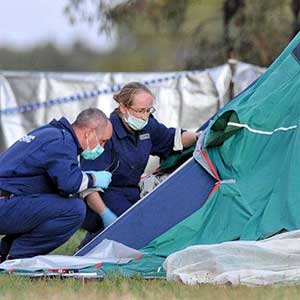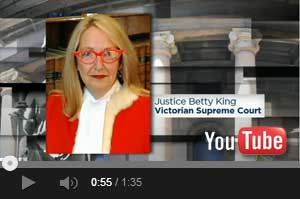Another appalling Aboriginal domestic violence story
A 'horror story' case has drawn attention to the way the federal government is funding support and prevention services to deal with family violence in Indigenous communities.
Jenni Smith, the head lawyer at Victoria's Aboriginal Family Violence Prevention and Legal Service says the Veronica Hudson case is an extreme example of what can occur to Indigenous women, but she says the less extreme cases are troubling too.
Woman abused for years jailed for killing partner
ABC News 26 April 2013
A Victorian woman who stabbed her partner to death after years of domestic violence has been sentenced to six years in prison.
Veronica Hudson pleaded guilty to manslaughter after stabbing her partner, Woody Heron, during a drunken fight outside the tent they were living in at a Bendigo caravan park two years ago.
Heron was described as jealous and having no conscience.
He had served five years in prison for a vicious attack on Hudson.
Hudson, 43, had been sexually abused from a young age and became a prostitute at 13.
Justice Betty King said something must be done to stop this type of domestic violence.
We must stop this appalling violence, being inflicted one upon the other, by members of the Indigenous community.
"Your life reads like a horror story and I have no doubt people have tried, at different times, to help," she said.
"You've had years of abuse. Sexual, physical and emotional. And we, the rest of the community, appear to have been powerless to stop it.
"We must stop this appalling violence being inflicted one upon the other, by members of the Indigenous community."
The court heard since being in the Dame Phyllis Frost Centre, Hudson's life has turned around.
She has completed cooking and computer courses and sought help for health problems.
"It is a rare thing to see people utilising the prison system for rehabilitation purposes and I'm heartened by your desire to do better for yourself," Justice King said.
"You need assistance, you need support and hopefully with all of that you may become a more functioning member of the community, more supportive to your son and more responsive to the social mores of our community."
Hudson cried as she was sentenced to six years' jail. She can apply for parole after serving three years.
Tackling Indigenous domestic violence

Greg Dyett SBS World News Australia 16 May 2013
(Transcript from SBS World News Australia Radio)
It's a life a judge in Victoria described as reading like a horror story, one of the many appalling stories within Australia's Indigenous community.
In passing sentence on a woman who killed her abusive partner, Supreme Court judge Betty King lamented what she called the limited success Australia's had in trying to stem the high rates of family violence among Aboriginal and Torres Strait Islanders.
They're at least twice as likely to experience violence than their non-Indigenous counterparts.
As Greg Dyett reports, the case has drawn attention to how the federal government is funding support and prevention services to deal with this endemic problem.
A ward of state who was sexually abused, a prostitute at age 13, a heroin addict and someone who endured years of abuse from violent men.
Veronica Hudson's life was described as a tragedy in the true sense.
She's just been sentenced to six years in prison for stabbing her violent partner to death during an alcohol-fuelled argument at a caravan park in central Victoria.
When passing sentence, Justice Betty King described the case as one of the many appalling stories within the Indigenous community. Justice King says Australia must do something about the violence.
"There are so many appalling stories within the Indigenous community in Australia and it is hard to know where to start to do something about it. What is not be doubted is that something must be done, we cannot let this continue as a society, we must stop this appalling violence being inflicted, one upon the other by members of the Indigenous community. Whilst there have been so many attempts to alleviate these problems we have had as a community such limited success, your life reads like a horror story."
Veronica Hudson stabbed her partner Edward Heron at a caravan park in Bendigo on Boxing Day 2011.
The court heard that in the years leading up to the stabbing family members feared the relationship would eventually end with either her death or Edward Heron's.
"The relationship with Mr Herron has been appallingly violent. You described him as cutting your arms, hand, throat, pulling your teeth out with pliers. That he was incredibly jealous, very suspicious, always believing that you were having sex with any male that you met, including with your son, your son's friends or any male around the area, the more he drank, the worse the jealously was."
In sentencing Veronica Hudson to six years in jail with a minimum of three, Justice King recognised she was remorseful and her prospects for rehabilitation were excellent.
"I do accept that you have Post Traumatic Stress Disorder from the life and treatment that you've received over the years in terms of physical, sexual and emotional abuse. You have been, as was] described, violated, belittled, and isolated from any form of support by the deceased. I accept her diagnosis of a dependent personality disorder and substance abuse dependency. You need assistance, you need support and hopefully with all of that you may become a more functioning member of the community."

The Aboriginal Family Violence Prevention and Legal Service Victoria is a primarily government-funded organisation that provides assistance to victims of family violence and sexual assault and works with families and communities affected by violence.
Its chief executive Antoinette Braybrook says one major challenge is the restrictions placed on the funding her organisation receives from the federal Attorney General's department.
She says it restricts her service to funding only a few identified rural and remote areas which she says is a problem when about 50 per cent of Aboriginal people in Victoria live in urban areas.
Ms Braybrook says the thinking behind that restriction is that those women will access mainstream services.
"We all know the barriers to accessing mainstream services and we're advocating strongly about the need for culturally-safe services, legal and other support services for Aboriginal women in urban and other areas that the Commonwealth government won't let us service."
Ms Braybrook says there's also too much uncertainty over funding which make things difficult.
She says in May last year $4.5 million was taken from several family violence prevention legal services which had been used for early intervention and prevention work.
"That money was just taken from the program even though there were a number of successful programs delivered Australia wide. I think that's where we fall over with government just funding things on a short term basis and then, you know, just zipping that away because something else might be the flavour of the month."
The Federal Government has defended that decision.
The Parliamentary Secretary to the Attorney General is Shayne Neumann.
"It was always anticipated that that particular program would cease and there was no expectation of renewal and the organisations knew that already. So the government wanted to put some more money into the Northern Territory to support the Stronger Futures program up there particularly as this is an area of real concern up in the Northern Territory in terms of domestic violence and so the government supported that and transferred the money from effectively from one Indigenous program to another Indigenous program so these organisations, these Indigenous family violence prevention legal services continue to receive their core funding and they continue to have a focus as I understand it in early intervention as well."
Jenni Smith is the head lawyer at Victoria's Aboriginal Family Violence Prevention and Legal Service.
She says the Veronica Hudson case is an extreme example of what can occur to Indigenous women.
But she says the less extreme cases are troubling too.
Jenni Smith has heard of cases where police effectively put family violence in the 'too hard' basket by taking intervention orders out on both parties.
"To us it's so apparent, there mightn't be that level of injury but there's been clear physical violence and the perpetrator hasn't been physically assaulted. I don't know if it's helpful for us to just dwell on the extremes, they make the good cases but we work in that whole spectrum of levels of violence from the psychological through to the physical and sexual."
Antoinette Braybrook says her organisation receives no funding for policy and advocacy which means it gets less attention than it deserves.
"It's important to say that not one family violence prevention and legal service in Australia receives funding from the Commonwealth government or any other government to undertake policy and advocacy work. All of that funding goes in to the Aboriginal legal services that have, you know, a major focus on criminal justice so it's kind of pushed into that, you know, deaths in custody, over-representation of people in prisons and that kind of area not into family violence so we're invisible, essentially, to the policymakers because we're not given that funding to undertake policy and advocacy work like Aboriginal legal services are." But again, the Parliamentary Secretary to the Attorney General Shayne Neumann takes issue with this.
"The core business of these organisations is in court support, family violence prevention activities and community engagement and legal assistance, that's there core business. If they want to engage in those other activities that's there business but we're funding them to assist people who face terrible situations of domestic violence and are in the process of court support needs."
Mr Neumann says there's anecdotal evidence from the Northern Territory that one of the keys to reducing domestic violence is reducing access to alcohol.
He says while family violence in Indigenous Australia is endemic, some progress is being made.
"We are seeing improvements but they are coming too slow and we're making up for many decades of neglect indeed it could be argued hundreds of years of abuse and when I think of what Paul Keating said in his famous Redfern speech, there's a lot of work to be done, still."


